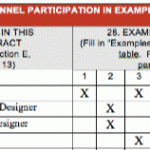I was at a conference recently and a competitor asked why we didn’t have a booth.
“I don’t believe in booths,” I explained.
This lady’s jaw dropped. Then she tried to pitch me on why getting a booth is a good idea.
It’s not. Here’s why:
Booths, By Their Nature, Are A Reactive Approach To Marketing
I love my competitor’s booths. It keeps them away from the potential clients. They are at their booth, hoping that the right person stops by, and I’m off talking to the clients.
Clients Are Immune To Booths
Clients see booths for what they are: you trying to sell them something. If a client is within 20 feet of a booth, their guard goes up.
Nobody Wants Your Crap
Nobody wants those give aways. I don’t care if it’s a Lego set of a famous building or a pen with your firm’s name. It’s crap.
Your Booth Reinforces The Fact You’re Indistinguishable From Your Competition
It’s hard for clients to tell us apart. It’s no wonder, since our booths are basically identical.
Here is your typical booth:
A nice picture, a slogan, a list of services, and your logo.
That’s every booth in the A/E/C industry.
You Are Supporting The Organization…Great, But Your Clients Could Care Less!
If a client asks you to sponsor their event, think twice before saying no. However, in general, a client will not give you more credence if you buy a booth at a conference they attend. They paid a lot of money to be there. You paid for the right to advertise to them. In their eyes, your booth isn’t doing them any favors.
Key Takeaway: Think twice before getting a booth. It might not be as effective as you may think!
Disagree? Leave a comment!






I agree with you in part, and disagree with you in part.
(Bias here is that we rarely pay cash for our trade show booths; the demographics of our markets generally match the conference where we want to “sell” and thus the show organizers provide the booths as a trade-out.)
The booth serves two useful functions. One, it sets the stage for you to sell to other exhibitors, so if you have a market that serves that segment of the conference, you are putting yourself in a better space.
Second, it provides you with a holding spot, and an “easy connect” location, especially for larger events and activities.
That said, we are extremely wary of paying cash for booth-type sponsorships, especially for smaller conferences. I shudder at the waste if we had actually paid meaningful sums for our table at one event, so remote that I doubt a conference could be held at a more remote northern location. (Like three hours in a jet by a specialized northern airline, to a city with a population with less than 8,000, and no road access — on Baffin Island!)
Then again, when we completed our work and published the magazine, a simple marketing piece brought six “yeses” from qualified large-scale advertisers. They simply were amazed that we were able to get there, report on things, and actually enough advertising to more than cover the travel costs and conference fees.
Mark,
Thank you for commenting. I think your approach is solid.
You may be in a different position because when you go to an A/E/C conference, everyone there could potentially be your client. Even when you are sitting at a booth, you are sitting among potential clients.
With us, we’re often sitting among our competition. I think that’s inherently less productive.
When it comes to comparing your business to the typical design or commercial construction firm, it’s not always apples to apples.
Good point Mark. As an environmental consultant in a primarily subconsultant role, we do a lot of good networking with other teaming partners during the “downtime” when attendees are attending conference sessions. I think many firms view this as an opportunity with having a booth as well.
I am convinced that “could care less” is the most improperly overused expression in the English language. People use that expression to say that they don’t care about something. But think about it. If you really “could care less,” then you are actually saying that you DO CARE SOME. You have to care just a little bit in order to care less. The proper expression is “couldn’t care less.” That says you could not care any less because you already don’t care at all. Okay. End of soapbox!
Thank you Bernie! I learn something new everyday. I’ll have to make it a point to remember that.
By the way, I totally agree with you about conference booths. I feel the same way about hosting evening hospitality rooms because I have seen too many conferences where people went from one to the next to the next in order to turn snacks into a free dinner, without speaking to any of the hosts in any of the rooms. On the other hand, a morning hospitality (breakfast) can sometimes be effective, but you have to know your crowd.
I can see where a morning hospitality suite might be interesting. Typically, the breakfasts suck at these events.
I love this article and most people don’t get it.
My only exception to having a booth is when you’re in a highly vertical industry where no can compete with you– the booth builds your brand dominance in that vertical.
For my clients that “need” a booth because of the higher ups, I usually suggest manning the booth with the marketing team while the business development team participates in the conference. The BD person is more likely to start a conversation with someone while the marketing person needs someone to approach them.
Thank you for responding. Good comment. It’s rare to completely dominate a specific market. I tip my hat to any firm that does.
As ususal – I love your unique approach to this topic and agree with the general sentiment. However, I thinkg booths can be beneficial when entering a new market sector/region to gain brand awareness. In addition, we have recently introduced a design software capbility that we may potentially go commercial with – and it was great to have people come through and utilize the demo. Tradeshow booths, as with all marketing initiatives, are useless if you don’t do something “different” – not only to attract attention, but to show how you provide value to the client. Otherwise – just take your place in line at (insert booth # here).
Thank you for commenting. You make a good point about demonstrating your new software. However, I imagine that’s quite uncommon.
Yes – that’s an new one for us. We try to target our approach and shows so we don’t just blend in. I’m sure you’ll get plenty of feedback on this topic, as it will ruffle many feathers of those trying to justify their annual spending for booths!
We were considering buying a booth set up for trade shows but this was exact viewpoint that many had… thank for the reassurance 🙂
Jessica,
That’s certainly the benefit of a forum like this where we can start a conversation about these issues! Thank you for sharing your situation.
Thank you. I thought my views on this topic were not commonly shared by others.
Like Mark and Justin, our firm is able to network with other exhibitors which are generally strategic teaming partners when we exhibit at a conference. That said, we are highly selective about where we exhibit and consider not only the networking opportunities but also the cost of the conference. In order to make the exhibit worthwhile, we need a blend of folks to attend – marketing, capture, project managers and executives. This allows us to maximize the booth space for potential clients and also allows us to walk the floor, attend sessions and hold meetings.
Like you, Matt, we also skip the booth all together for selected conferences. These are conferences, for example, where the exhibit space is cost prohibitive. In this case we send a one to three people and their goal is to talk to clients and teaming partners.
Using both approaches has worked out well for us. It keeps our marketing costs in balance while also allowing us to be at the industry conferences where we will meet current and future clients.
Great post leading to great discussion!
Carrie Ann,
Thank you for commenting.
Typically, we don’t pay for booth space. We barter for it. If we facilitate a breakout session, we ask for booth space in kind. While I have not been a fan of booths in the past, I have to say that the last few conferences have yielded some good clients and potential clients. I think why this is working for us is….we lead breakout sessions. People love our sessions and then come visit our booth. So, our strategy is to try to book our break out session(s) early in the day. This way, potential clients have the rest of the day to come by our booth. It has worked!